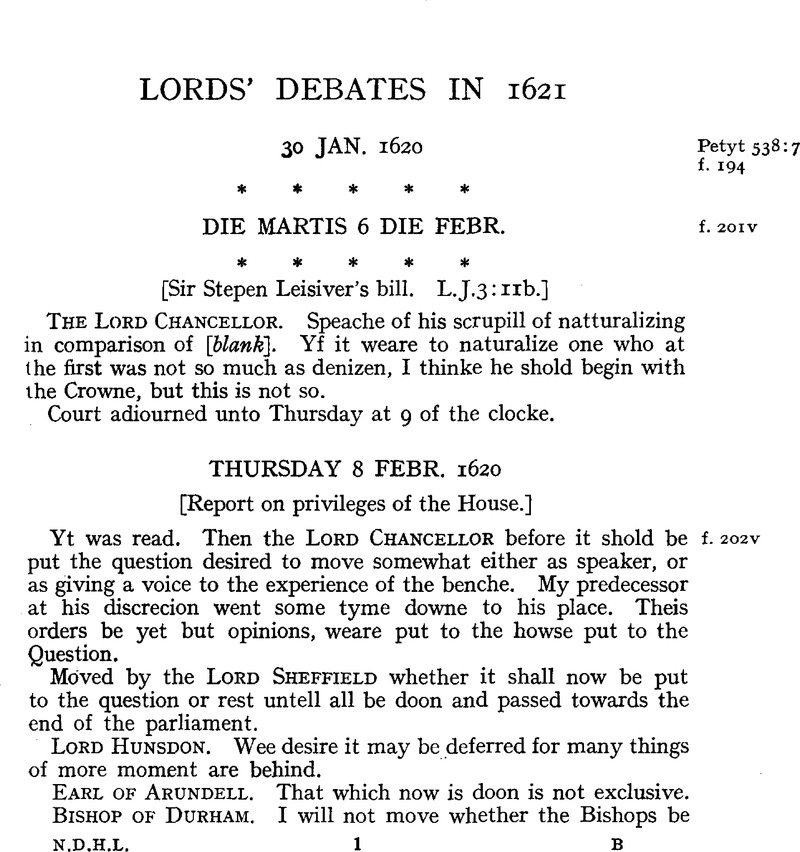No CrossRef data available.
Published online by Cambridge University Press: 24 December 2009

page 12 note 1 This is the last that Robert Bowyer wrote. What follows for this day has the appearance of having been copied in after the day's proceedings were over. An assistant clerk's notes may have been put into the clerk's book. Elsing's notes begin on the twelfth.
page 16 note 1 Not until after the end of the Parliament was Elsing able to obtain this report. Among the House of Lords MSS. is his memorandum of queries to the Lords' sub-committee for perusing the journal. One of the requests that he then made was that it would please their Lordships “also to set down the Report made 12 Marcii by the Earl of Arundell.” Some idea of the difficulties he had had previous to that time may be seen from the following letter to be found in the same collection:
“To my very loving freind Mr. Elsin.
“And Mr. Elsin, your servant was with me this morning, and I promised him to speak with you at the Haul concerning his message, and accordingly I tooke my corse, but stepping into Arundel house, I stayd so long with my Lord Marshal, that ear I was aware, Haule tym was past: I went purposly to my Lord Marshal about his report concerning othe and protestation of honor, he remembred it very well that being with the King accompanned with my Lord of Southampton, my self, and some 4, or 5 others of my Lords to awnswer a kynd of accusation the Judges had made that we had appointed them to serch what priviledges belonged to the Nobilitie, which they dared not to take in hand without his Majesties leave, bycause the same they conceaved to trenche uppon the Prerogative. The King, satisfied with the explanation of our intention and doings, added concerning that particular of swering, that he consented to our protestation and with commending our discret proceeding said he would rather add to our priviledges, then take any away, and as being this question whether we thought protestation uppon honor, or othe to bynd more, we all una voce awnswered protestation of honor, to which he allso aggred : Thearfor pleas you Mr. Elsin for your better satisfaction to resort to my Lord Marshal, and receave the report from his own mouthe, you shal do right to enter the report accordingly, and [do] us all a good office. And so for this present I take my leave ever resting Your very assured frend to my power
In the end Elsing himself drew up a brief report which was corrected and expanded by Clare, and then a fair copy of the same made which was sent by him to Arundel for his approval. All three of these are to be found among the House of Lords MSS., but only the first and last are given here.
“12 Marcii, 1620.
“The Erie of Arundell reported, that on Satterday last the Lords Committees for priviledges, etc., attended his Majestie (according to the Order of 30 Marcii) and satisfyed his Majesti, that their inquyringe of the priviledges belonginge to the Peeres dyd noe waye trenche uppon the Kings prerogative (as the Judges suppossed when the sayd Committee dyd demaunde their resolucion of some of their priviledges). And his Majestie was very well satisfyed of their intention and proceedings herin. That he sayd He would rather add to their priviledges then take any away. And then his Majesti dyd of him selfe demaunde of the sayd Committee whether they thought that their Protestacion uppon Honour, or their aunswere uppon oathe dyd bynde them more. And their Lordships all aunswered Una voce, their protestacion uppon Honour. Wherunto his Majesti allso agreed and sayd He was well contented therewith soe yt dyd not hynder the publique Justice.”
“12 Marcii, 1620.
“The Erle of Arundell reported that on Satterdaye the Lordes Committees appointed to give his Majestie satisfaction in their proceedinge for their priviledges as alsoe with the Judges, attended his Majestie accordinge to the Order of 30 Marcii And said his Majestie was pleased to rest satisfied as well in theire inquirie of the priviledges belonginge to the Peeres, as alsoe that the same did noe way trench into his royall prerogative, as the Judges had suggested, when the Lords Committees demanded their resolution, on what they should find in their bookes and readinges of the Lawes concerninge the same, and further his Majestie was pleased to fall upon the particuler, of noble mens protestinge upon their honor, and theirin satisfied withe the Presidents alledged, in the times of sundrye his Royall progenitors, and that the ymposition of oathes upon them was introduced and used, onelye in later times, his Majestie alsoe allowinge the same, was pleased to aske this question, whether they thought protestation uppon honour or oath to binde more, to which the Lords all aunswered Una voce that they conceived protestation of honour to bind more than oath did, as beinge the same before God, and before the world in regard of the trust given to their degree a far greater charge to which his Majestie alsoe agreed, and further said, he was soe farr from deminishinge their priveledges as he would rather add unto them, and soe much he accepted of their dutifull respects, and discreet proceedings therein, that the Judges should be hereafter assistinge in what they should desire to ymploye them.”